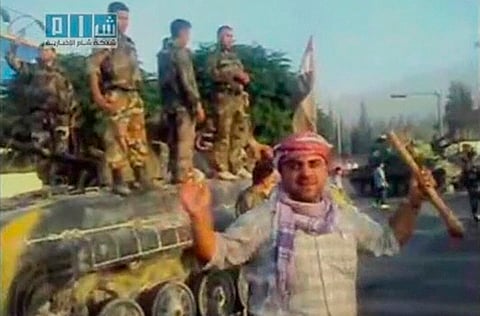140 killed as Syrian tanks storm Hama
Scores of wounded people and shortage of blood for transfusions in the city

Nicosia: At least 140 people were killed on Sunday when the military launched an attack on the flashpoint protest city of Hama in central Syria, a human rights activist said.
Ammar Qorabi, who heads the National Organisation for Human Rights, reported the toll and also said army attacks across the country on Sunday killed at least 140 people and wounded dozens more.
Top tribal leader arrested
Syrian forces have arrested Shaikh Nawaf Al Bashir, head of the main Baqqara tribe in rebellious Deir Al Zor province and a prominent figure in the campaign against President Bashar Al Assad, opposition sources told Reuters on Sunday.
Secret police agents arrested Bashir, who commands the loyalty of an estimated 1.2 million Baqqara, in Ein Qirsh district of Damascus on Saturday afternoon, they said.
Hours before his arrest Bashir told Reuters he was striving to stop armed resistance to a military assault on the provincial capital of Deir Al Zor and to convince inhabitants to stick to peaceful methods, despite killings by security forces.
Earlier reports
Earlier, Rami Abdul Rahman of the Britain-based Syrian Observatory for Human Rights reported a death toll in Hama of 45, but said that number could rise because of the number of seriously wounded and a lack of medical supplies.
There were scores of wounded people and a shortage of blood for transfusions, he said by telephone from the city, which has a population of around 700,000.
"Tanks are attacking from four directions. They are firing their heavy machineguns randomly and overrunning makeshift road blocks erected by the inhabitants," he said by phone, the sound of machinegun fire crackling in the background.
"The casualties are higher. There are bodies uncollected in the streets," said another resident, adding that snipers had climbed onto the roofs of the state-owned electricity company and the main prison.
Al Assad is attempting to crush an uprising against his 11-year rule that broke out in March, inspired by 'Arab Spring' revolutions in Tunisia and Egypt, and has spread across the country.
Syrian authorities have expelled most independent journalists, making it difficult to verify reports of fighting.
Hama was the scene of a massacre in 1982 when Al Assad's father, the late president Hafez Al Assad, sent his troops to crush an Islamist-led uprising, razing whole neighbourhoods and killing up to 30,000 people in the bloodiest episode of Syria's modern history.
The US ambassador to Syria, Robert Ford, visited the city earlier this month in a gesture of international support for what he described as peaceful pro-democracy demonstrations.
Turkish Prime Minister Tayyip Erdogan, once one of Al Assad's main allies, said in May that "we do not want to see another Hama massacre", and warned the 45-year-old president that it would be hard to contain the consequences if it were repeated. The Syrian leadership blames "armed terrorist groups" for most killings during the revolt, saying that more than 500 soldiers and security personnel have been killed.
An activist group, Avaaz, said in a report last week that Syrian security forces had killed 1,634 people in the course of their crackdown, while at least 2,918 had disappeared. Another 26,000 had been arrested, many of whom were beaten and tortured, and 12,617 remained in detention, it said.



